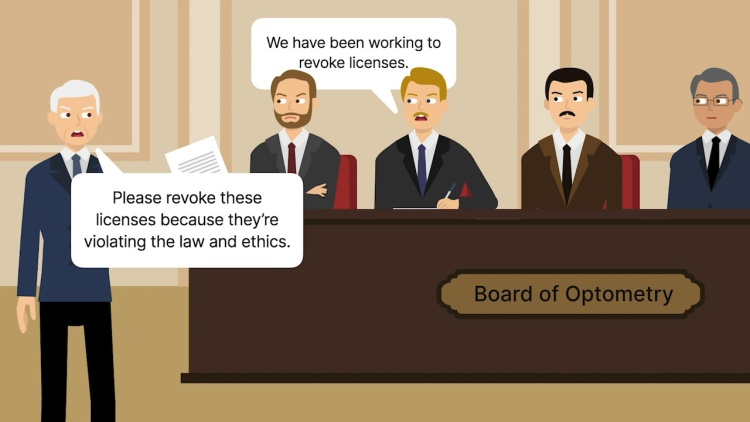Gibson v. Berryhill
United States Supreme Court
411 U.S. 564 (1973)
- Written by Peggy Chen, JD
Facts
Before 1965, Alabama permitted any person, including businesses and corporations, to maintain a department in which “eyes are examined or glasses fitted.” In 1965, this statute was repealed. Soon after the repeal, the Alabama Optometric Association (AOA) filed charges with the Alabama Board of Optometry (Board) against a group of optometrists who were employees of Lee Optical Co. (Lee), alleging that because the practice of optometry by individuals employed by corporations was no longer permitted by Alabama statute, the optometrists had violated the ethics of their profession by working for Lee. Shortly after this suit was filed, the Board filed a similar action against Lee in state court, seeking to enjoin Lee from the unlawful practice of optometry. The Board’s complaint named the optometrists employed by Lee as parties defendant, charging them with aiding and abetting Lee. The suit before the Board was stayed while the state court suit was heard. The state court rendered judgment for the Board, and enjoined Lee from practicing optometry and employing licensed optometrists. Lee appealed. The Board then reactivated the proceedings against the optometrists employed by Lee. The optometrists (plaintiffs) filed a complaint in the United States District Court against the Board of Optometry and its individual members (defendants) seeking an injunction against the Board hearings. The suit argued that the statutory scheme regulating the practice of optometry in Alabama was unconstitutional because it permitted the Board to hear pending charges and the Board was biased and could not provide a fair and impartial hearing in conformity with due process. The district court agreed.
Rule of Law
Issue
Holding and Reasoning (White, J.)
What to do next…
Here's why 907,000 law students have relied on our case briefs:
- Written by law professors and practitioners, not other law students. 47,100 briefs, keyed to 996 casebooks. Top-notch customer support.
- The right amount of information, includes the facts, issues, rule of law, holding and reasoning, and any concurrences and dissents.
- Access in your classes, works on your mobile and tablet. Massive library of related video lessons and high quality multiple-choice questions.
- Easy to use, uniform format for every case brief. Written in plain English, not in legalese. Our briefs summarize and simplify; they don’t just repeat the court’s language.





